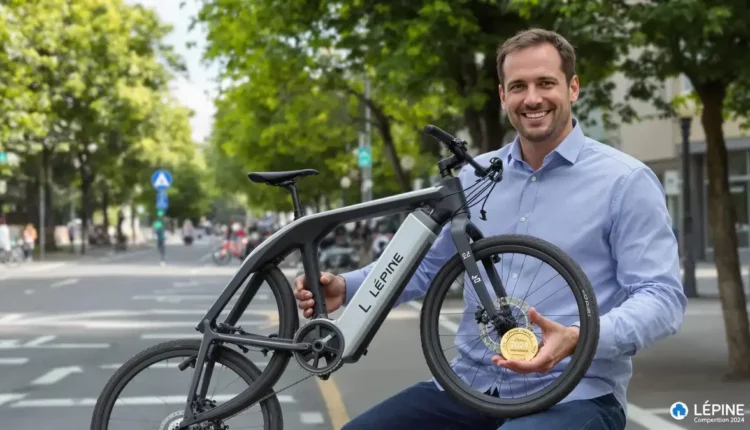©2021 Reporters Post24. All Rights Reserved.
A French engineer has revolutionized the field of cycling with a battery-free electric bike, integrating supercapacitors for efficient energy storage. This innovation, recognized with a gold medal at the Lépine Competition 2024, offers a significantly reduced environmental impact due to the absence of lithium batteries and the use of recyclable materials. Weighing less than 20 kg, this bike is designed to minimize wear on urban infrastructure while promoting sustainable mobility.
The essentials of the information
- Innovative, a battery-free electric bike uses supercapacitors.
- 100% French technology, awarded at the Lépine Competition 2024.
- Reduced environmental impact due to the absence of lithium batteries.
- Lightweight design and Pi-Pop system optimizing energy capture.
A French engineer recently presented a revolutionary innovation in the field of sustainable mobility: a battery-free electric bike, equipped with supercapacitors. This bike, which represents a major advancement for cycling, has been designed to address contemporary environmental challenges while offering a practical solution for urban commuting.
Use of supercapacitors for energy storage
Instead of traditional lithium batteries, which pose recyclability and ecological impact issues, this bike uses supercapacitors to store energy. These devices offer several advantages, including near-instant charging and discharging times, allowing users to benefit from electric assistance with every pedal stroke.
100% French technology
This innovation is not only a technical feat but also a product of French excellence. Indeed, the bike has been awarded a gold medal at the Lépine Competition 2024, illustrating its potential and ingenuity in the cycling sector. This recognition demonstrates the engineer’s commitment to promoting sustainable and innovative solutions in the market.
Reduced environmental impact
One of the most attractive aspects of this innovation is its reduced environmental impact. By replacing lithium batteries with cleaner technologies, the engineer contributes to a more ethical and sustainable approach to cycling. Additionally, the materials used for the bike’s design are recyclable, thus minimizing waste and the associated carbon footprint.
Lightweight design for urban infrastructure
Weighing less than 20 kg, this bike features a lightweight design that limits wear on urban infrastructure. This makes it an ideal choice for cities, where concerns about the maintenance of roads and bike paths are growing. By reducing the weight of the bikes, there is also a decrease in the risk of surface degradation where they operate.
Pi-Pop: an innovative energy system
The bike is also equipped with the Pi-Pop system, which allows capturing energy generated during pedaling, braking, or when the cyclist goes downhill. This mechanism not only makes the bike more efficient but also increases its autonomy without requiring additional charging time due to the supercapacitors.
Advantages of supercapacitors
Supercapacitors offer an estimated lifespan of 15 to 20 years, far surpassing that of conventional batteries. In addition to their longevity, they allow for more practical and less polluting use. The engineer carefully selected this technology for its suitability to meet the expectations of environmentally-conscious modern users.
Suitable for urban commutes
This electric bike is primarily designed for urban commutes, where frequent stops and starts maximize the efficiency of the supercapacitors. However, it proves less effective on rugged terrain or uphill, temporarily limiting its use in certain areas. That said, for city dwellers, it represents an effective and eco-friendly solution.
Sales forecasts
The economic prospects for this product are promising. Veloci Industries, the company behind this innovation, anticipates reaching up to 10,000 annual sales within the next five years. With the rise of awareness around sustainable mobility, it is likely that this bike will attract a broad audience eager to reduce their carbon footprint while enjoying an efficient means of transportation.
Innovation and sustainable mobility
This advancement in electric bike design is not merely a product but represents a true transformation of cycling practices. By integrating eco-friendly technologies, the French engineer expands the possibilities of sustainable mobility, proving that innovation can align with environmental respect. Thus, this initiative could redefine the future of urban cycling by aligning transport practices with contemporary sustainability challenges.


